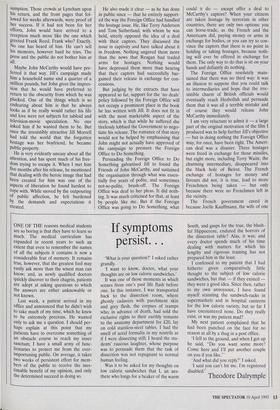If symptoms
persist. . .
ONE OF THE reasons medical students are so boring is that they have to learn so much. The medical curriculum has expanded in recent years to such an extent that even to remember the names of all the subjects it contains is now a considerable feat of memory. It remains true, however, that the greatest fool may easily ask more than the wisest man can know; and, as newly qualified doctors quickly discover to their chagrin, patients are adept at asking questions to which the answers are either unknowable or not known.
Last week, a patient arrived in my office and announced that he didn't wish to take much of my time, which he knew to be extremely precious. He wanted only to ask me a question. I should per- haps explain at this point that my patients have to overcome something of an obstacle course to reach my inner sanctum; I have a small army of func- tionaries to protect me from the ever- Importuning public. On average, it takes two weeks of persistent effort for mem- bers of the public to receive the ines- timable benefit of my opinion, and only the determined succeed in doing so. 'What is your question?' I asked rather grandly. 'I want to know, doctor, what your thoughts are on low calorie sandwiches.'
It was one of those moments in which scenes from one's past life flash before one. In this instance, I was transported back to the dissection room, where ghostly cadavers with parchment skin and grey flesh, the corpses of tramps who, in advance of death, had sold the exclusive rights to their earthly remains to the anatomy department for £20, lay on cold stainless-steel tables. I had the smell of acrid formalin in my nostrils as if I were dissecting still; I heard the stu- dents' raucous laughter, whose purpose was to persuade them that the task of dissection was not repugnant to normal human feeling.
Was it to be asked for my thoughts on low calorie sandwiches that I, an aes- thete who longs for a beaker of the warm South, and gasps for the true, the blush- ful Hippocrene, endured the horrors of the dissection table? Alas, it was; and every doctor spends much of his time dealing with matters for which his lengthy and rigorous training has not prepared him in the least.
I confessed to my patient that I had hitherto given comparatively little thought to the subject of low calorie sandwiches, but that — if they existed — they were a good idea. Since then, rather to my own annoyance, I have found myself scanning the sandwich-racks in supermarkets and in hospital canteens for the low calorie variety, but so far I have encountered none. Do they really exist, or was my patient mad?
My next patient complained that he had been punched on the face for no reason at all by a thug in a post office.
'I fell to the ground, and when I got up he said, "Do you want some more? Come here and I'll put another couple on you if you like."
'And what did you reply?' I asked.
'I said you can't hit me. I'm registered disabled.'
Theodore Dalrymple


























































 Previous page
Previous page